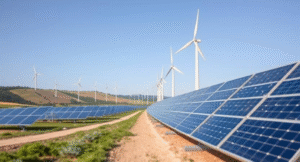The rapid development of many industries, urbanization, and economic growth are causing increased global demands for energy supply. By 2040, a 1.2% yearly increase in energy supply is predicted.
By signing the Energy Community Establishment Agreement, Bosnia and Herzegovina joined other members to create the largest internal market for electricity and gas at the global level.
As one of the signatories of this Agreement, Bosnia and Herzegovina commits to implementing the AQUIS communautaire in the fields of energy, environment, competition, and renewable energy. With abundant natural resources, favorable hydro and solar conditions, and significant forest coverage relative to its territory size, Bosnia and Herzegovina has an excellent perspective for implementing the Green Agenda and generating energy from renewable sources.
Despite being the only net exporter of electricity in the Western Balkans, Bosnia and Herzegovina incurs significant costs of air pollution and health impacts due to the dominance of fossil fuels in its current energy structure. According to 2021 data, the total electricity production in Bosnia and Herzegovina was 17 TWh, with 62% from coal, 35% from hydro, and the rest from solar and wind energy. In order to meet the goals of the Green Deal, Bosnia and Herzegovina recently confirmed its intention to achieve a 43.6% share of renewable sources in gross final consumption by 2030. In other words, according to Bosnia and Herzegovina’s energy policy, the plan is to obtain 85% of energy from hydropower by 2035, 9% from wind, 2% from solar, and 4% from biomass.
To date, integrated short-term and long-term strategies aimed at increasing the share of various renewable sources ensure Bosnia and Herzegovina’s energy security and enhance its readiness to join the European Union. In accordance with the current laws in Bosnia and Herzegovina, foreign investors are guaranteed, among other things, the same rights and obligations as domestic investors. They have the same property rights as domestic investors, are protected from nationalization, expropriation, and requisition, and have the right to transfer profits abroad. These rights cannot be nullified by subsequently enacted laws.
The tax system and incentives provide an additional advantage for Bosnia and Herzegovina compared to other countries, considering it has one of the most favorable tax systems in Europe (VAT rate of 17%, corporate tax rate of 10%). The corporate tax system also brings numerous benefits in certain parts of the country, such as the exemption from corporate tax in double the amount of the export value resulting from production. This implies that producers would be completely exempt from corporate tax with 50% of the produced and exported electricity.
There are also other incentives for investment, a reduction in the tax base up to a certain level, and exemptions from import duties for equipment used in production not manufactured in Bosnia and Herzegovina. This applies to equipment imported for new or expanded production, production modernization, the introduction of new or modernization of existing production technology, directly related to manufacturing activities.
However, in the near future, network limitations pose a risk. This initiative in Bosnia and Herzegovina is still on its reform path, and this may affect the speed and adequacy of project implementation.
To contribute to the transition to a fossil fuel-free economy, it is crucial to choose “cleaner” projects that will benefit the overall community.






